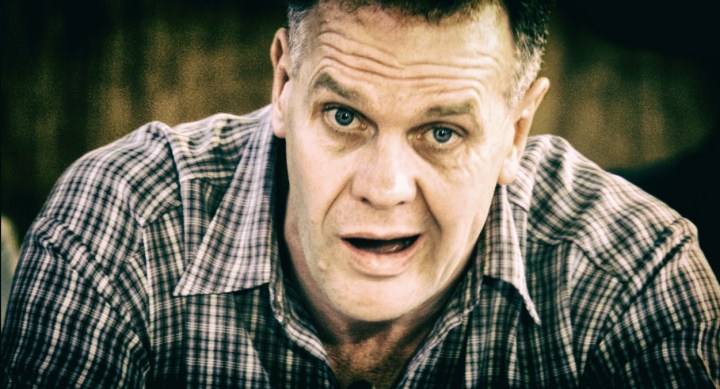ANALYSIS
Release of apartheid hitman Ferdi Barnard raises complex questions of forgiveness and justice

Apartheid hitman Ferdi Barnard gunned down activist and academic David Webster outside his home in 1989. It took almost a decade for Barnard to be convicted of the crime, and now he is set to be released on 2 April 2019 after just over 20 years behind bars. The Department of Justice says that extensive consultation was undertaken before approving the parole — but the very idea of freedom for apartheid’s triggermen will always be contentious.
It was Reverend Paul Verryn who conducted the funeral service for the assassinated anti-apartheid activist David Webster, almost 30 years ago.
The two men had worked together closely in the years before Webster, 45, was killed by a blast from a shotgun wielded by apartheid hit-squad member Ferdi Barnard.
“His murder was quite devastating. It was so calculating and brutal,” Verryn told Daily Maverick.
“David was a very fine human being who did a huge amount to anticipate the transition this country needed to go through.”
Webster’s murder came just nine months before the release of Nelson Mandela from prison.
An anthropologist by training, Webster straddled the worlds of activism and academia and was revered in both. He had a particular interest in working to improve the situation of political prisoners and their families: both in terms of arranging practical support and in researching the torture methods employed by apartheid security forces on detainees.
It was Webster’s investigation into the security forces that would see him placed on a hit-list by the apartheid government’s Civil Co-operation Bureau. Barnard was the assassin given the task of killing Webster — which Barnard did by mowing him down in front of his partner Maggie Friedman as the couple returned home from a shopping trip.
Barnard eventually paid for his crime, but enjoyed a decade of freedom before he could be successfully prosecuted for murder. On 2 April 2019, he is due to be released on parole after serving just over 20 years in prison.
Whether 20 years is an adequate incarceration period for one of apartheid’s most notorious murderers is a question with no straightforward answer.
Announcing Barnard’s release on Thursday, a statement from the Department of Justice said that Barnard had met the necessary requirements for parole; a complex process which takes into account time served, psychological assessments, and consultations with the family of the victim.
But the fact that Barnard’s release meets the technical letter of the law will not stop debate about what constitutes justice for the heinous deeds committed by apartheid’s henchmen.
“It’s a very difficult question to answer,” says Verryn.
“I suppose the real issue is whether that person [the perpetrator] understands, or has any kind of insight, into the complete wastage of a life for which they are responsible.”
In Barnard’s case, Verryn met with the convicted murderer “some years ago” in his Pretoria prison as part of a session organised by the officiating psychologists.
“At that stage, I wasn’t convinced that he had insight into what he had done,” Verryn says.
“He just knew the right words to speak, in terms of apology and seeking forgiveness.”
At the same time, Verryn says that he has been involved in the process that takes place before such offenders are cleared for parole, and describes it as a “fairly substantial amount of work”.
The Department of Justice stated that Minister Michael Masutha had personally met with Webster’s partner Maggie Friedman, who “indicated that she had no objection to the placing of Mr Barnard on parole”.
Significant weight is given in these instances to the wishes of the family of the victim — which Friedman described in a 2015 interview as amounting to “extraordinary pressure”. Friedman said at the time:
“It’s not right to give us some say in whether or not someone is released. Imagine a rape survivor being placed in that position. They can’t be objective. We can’t be objective, so how can we be a part of that?”
It is known that the family of struggle hero Chris Hani, murdered by Janusz Waluś and Clive Derby-Lewis, have strongly opposed parole for Hani’s killers in the past.
But other factors equally played a role, including an apparent lack of remorse from both men, their failure to provide a full account of the plot to assassinate Hani, and, in the case of Waluś, angry outbursts in detention.
It took a court judgment to secure the release of Derby-Lewis on medical parole in May 2015, with Derby-Lewis dying of lung cancer 18 months later. Waluś was most recently denied parole in January 2019.
Yet it is a reality, says Verryn, that “we are now going to have to start facing the release of some of these people”.
One of the issues around the freeing of apartheid killers is the extent to which their safety can be guaranteed outside the jail. In Barnard’s case, the justice department has stated that the community corrections office “will supervise and monitor him” for “the rest of his natural life”.
The prospect of these men ever being integrated into society properly seems highly unlikely — and many would argue rightfully so. The question of how society should deal with them is one that Verryn describes as “hugely complex”.
Adding to the complexity of the situation is that those who ended up seeing the inside of jail cells for apartheid crimes were generally the foot-soldiers of the regime, rather than the generals.
“There are many engineers of the [apartheid] edifice that have not been brought to book,” Verryn says.
“There are still people all over this country who have not yet found peace or restitution. There is still a large section of our society who carry a huge amount of unresolved grief.” DM


















 Become an Insider
Become an Insider